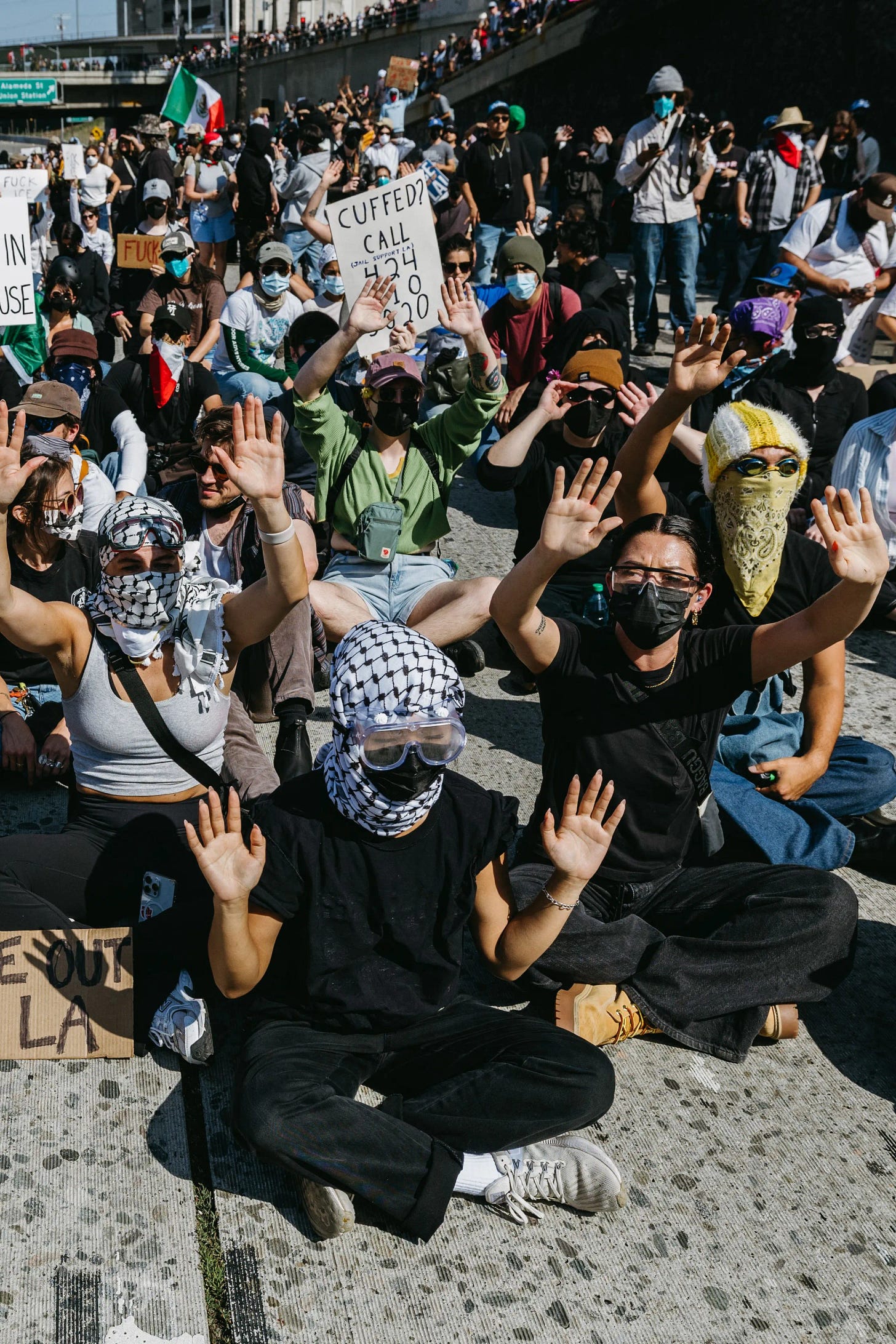La Impact Weekly: Week of June 9th 2025
ICE raids in LA, brand partnerships with next-gen materials, a rollercoaster of regulatory updates, and some amazing SME spotlights. 🫒
Hello sustainable fashion enthusiasts,
Welcome to this week's edition of La Impact Weekly, your weekly sustainable fashion download. 📰🌍
Here is a quick recap (with more details below):
𝐁𝐫𝐚𝐧𝐝 & 𝐈𝐧𝐝𝐮𝐬𝐭𝐫𝐲 𝐌𝐨𝐯𝐞𝐬
🫒 The Shirt Company launches inclusive curve range from UK 6-28, re-engineering fit rather than simple grading.
🫒 ECOALF debuts 'Bluetiful Stories' ocean sustainability podcast featuring Prince Albert II of Monaco.
🫒 Strathberry partners with Kimpton Hotels for luxury bag library at Edinburgh and Glasgow locations.
Prada Group and UNESCO launch €2M SEA BEYOND ocean preservation fund with first proposals due December 2025.
Kantamanto Social Club transforms 15 million weekly secondhand garments into premium upcycled pieces in Ghana.
𝐅𝐚𝐬𝐡𝐢𝐨𝐧 𝐓𝐞𝐜𝐡 & 𝐒𝐮𝐬𝐭𝐚𝐢𝐧𝐚𝐛𝐢𝐥𝐢𝐭𝐲 𝐈𝐧𝐧𝐨𝐯𝐚𝐭𝐢𝐨𝐧
Lululemon secures 10-year deal with Samsara Eco for 20% recycled fiber portfolio.
Loewe adopts orange citrus fiber from Pyratex made from fruit production waste with natural cooling properties.
Selenis confirms textile-to-textile recycling facility in Cedar Creek, North Carolina processing 50,000 tons annually.
𝐔𝐩𝐬𝐭𝐫𝐞𝐚𝐦 𝐍𝐞𝐰𝐬
Textile dyeing effluents contaminate India's sacred Cauvery River through illegal nighttime discharge from processing units.
Tirupur hosiery workers win interim relief preventing Rs. 1,700 monthly wage cuts in Tamil Nadu minimum wage dispute.
𝐑𝐞𝐠𝐮𝐥𝐚𝐭𝐨𝐫𝐲 & 𝐏𝐨𝐥𝐢𝐜𝐲 𝐒𝐡𝐢𝐟𝐭𝐬
ICE raids target LA's Fashion District arresting 100+ garment workers.
Swedish MEP proposes narrowing EU sustainability laws to companies with 3,000+ employees and €450M turnover.
French Senate backs modified fast fashion law targeting Shein and Temu while exempting European competitors.
Canada releases final environmental claims guidelines requiring substantiation to prevent greenwashing under Bill C-59.
UK launches consultation on private sector nature recovery investment incentives with August 7 deadline.
La Featured News: When "Made in America" Turns Against Its Makers
La Backdrop
The fashion industry really cannot catch a break.
A couple months ago we were hyping how "Made in America" brands have an edge with tariffs. Now these same garment factories are under attack.
Only 3% of clothes sold in the US are made here. And 1/3 of the 300,000+ workers producing clothing and shoes in the US are immigrants (in LA, where 83% of US-made clothes come from, many garment workers are believed to be undocumented). So that tiny sliver of domestic production? Made by the very people being hunted down.
This isn’t new. In 2019, ICE carried out major raids at poultry plants in Mississippi, resulting in about 680 arrests. Fast forward to June 2025: major raids at garment manufacturing facilities with 100+ people arrested across multiple sites in Los Angeles. But, there is clear escalation in response: Armored vehicles, National Guard deployment, and widespread protests that shut down city streets and freeways.
Los Details
ICE came for garment workers on June 6th, starting at Ambiance Apparel where they detained over 20 people (many from the same Mexican indigenous community who'd found work through word of mouth). The raids spread across LA, grabbing 40+ that first day and over 100 total.
These raids sent shockwaves through LA's garment district, where 45,000 workers make clothes for major brands (based on Open Supply Chain Hub some examples include: Reformation, Ralph Lauren, Disney, Adidas, Gap, Target, Nike).

Then rumors made it worse. WhatsApp messages claiming more raids were coming sent the district into panic mode, causing sales to drop by 50% across businesses in the area.
But the raids backfired. Protests erupted across Los Angeles and grew into a nationwide movement so large that President Trump deployed National Guard troops and Marines to a U.S. city for the first time in decades, all amid efforts to deport the very people behind “Made in America” clothing.
The anger reached its peak on June 14, during the “No Kings Day” protests. Organizers say over 5Mn people took part in more than 2,000 cities and towns across the country. The fashion industry quickly found itself at the heart of something far bigger than garment production.
Mi Take
Look, I'm not here for political takes (although you probably know where I stand). I am here to discuss what this means for the industry, and for you, my SME friends.
In the Vogue article, one designer said:
They have us surrounded. You can’t be made overseas and you can’t be made in the U.S.
How do we build “American manufacturing” without immigrants? Susan Scafidi from Fordham's Fashion Law Institute put it bluntly:
Unlike fashion design, garment production jobs are not glamorous positions to which many Americans aspire, but those jobs have long been rungs on the ladder of the American dream.
And it’s true. A recent study showed that Americans like the idea, but not the work (80% of Americans believe the country would be better off with more manufacturing jobs, just 25% believe they would individually be better off working in a factory.)
But, I guess tariffs were never about bringing textile manufacturing back to the US. It's time we stop the delusion that we're building a "Made in America" industry. This is something else entirely. And regardless of the reasoning, these are people. Where is the industry solidarity? Few brands have spoken out.
If you are a brand, and your supplier has or may be affected, you can:
Reach out and offer help. Have an open and empathetic conversation with your supplier about potential disruptions, and ask how you can support. For example, consider covering wages when workers are unable to come to work due to fear, detention, or trauma, or adjust payment schedules, lead times, and delivery expectations to give your supplier breathing room during immigration enforcement periods.
Speak up and organize. Join industry coalitions advocating for humane immigration reform and labor protections. Your voice, especially when tied to a consumer-facing brand, can influence policy and show solidarity with the workers who make your business possible.
Reaffirm your values in public. You can also inspire your customers a la Patagonia. After all, people clearly care (as seen by all the protests).
Diversify your production. If you haven’t already, begin spreading manufacturing across multiple locations or partners to reduce risk. This doesn’t mean abandoning impacted factories, it means building resilience in your supply chain while continuing to stand by partners under pressure.
In the end, I think we need to remember that immigrants are people. With families, roots, dreams. They're core to our industry and country. The question isn't whether you should speak up. It's why you haven't already.
What do you think about all of this? Should brands speak up?
Other News
Brand & Industry Moves
🫒 The Shirt Company launches inclusive curve range. The London-based premium women's shirt label expanded its sizing from UK 6 to UK 28 with a new "Curve Range" that moves beyond simple grading to re-engineer fit across different body types. The collection required months of refinement with various fit models to adjust dart placements, hem lengths, and button spacing rather than simply scaling up existing patterns. Read more.

🫒 Ecoalf launches 'Bluetiful Stories' ocean sustainability podcast. The Spanish sustainable fashion brand debuted its new podcast series "Bluetiful Stories - Healing with the Ocean" hosted by journalist and ocean advocate Cyrielle Hariel. The inaugural episode features Prince Albert II of Monaco discussing ocean conservation and marine sustainability initiatives. Read more.
🫒 Strathberry launches borrow bag library with Kimpton Hotels. The Scottish luxury handbag brand partnered with Kimpton to offer complimentary bag rentals for hotel guests at Edinburgh and Glasgow locations starting June 13. Guests can borrow curated Strathberry bags during their stay through room service as part of Kimpton's "Forgot it? We've got it!" campaign. Read more.
Prada Group and UNESCO launch €2M ocean preservation fund. At the 2025 UN Ocean Conference in Nice, Prada Group and UNESCO announced the SEA BEYOND Multi-Partner Trust Fund, starting with a €2 million contribution from Prada. The five-year fund aims to mobilize resources from various partners to restore the relationship between humankind and the ocean, with the first call for proposals expected by December 2025. Read more.
Kantamanto Social Club tackles overproduction through upcycling. Founded by Anabel Poh and Daan Sonnemans, this social enterprise partners with designers at Ghana's Kantamanto Market to transform discarded textiles into premium garments sold back to Global North consumers. The venture highlights fashion's waste absurdity, where 15 million secondhand garments arrive weekly from Europe and North America, yet 40% become garbage. Read more.
Fashion Tech & Sustainability Innovation Updates
Lululemon secures 10-year recycled fiber supply deal. The athleisure brand committed to sourcing 20% of its fiber portfolio from Samsara Eco's enzymatic recycling technology by 2035, representing a major vote of confidence for the Australian startup. Samsara Eco uses AI-powered enzymes to break down mixed textiles into monomers within 20 minutes, handling blends like polyester-cotton without separation issues. The partnership supports Lululemon's goal to reach 75% "preferred materials" by 2025, including 75% recycled polyester.. Read more.
Loewe adopts orange citrus fiber from Pyratex. The luxury brand integrated Madrid-based Pyratex's citrus-based fabric made from fruit production waste like orange and lemon peels into its latest collection. The fiber offers natural cooling, antibacterial, and UV-protective properties while using a circular approach that reduces landfill waste. Read more, Credit for Video below: Loewe Instagram.
Selenis confirms commitment to US textile recycling facility. Portugal-based ImatosGil Group reaffirmed plans to build a textile-to-textile recycling facility in Cedar Creek, North Carolina, despite nearby plant closures. The 150,000 square foot facility will process over 50,000 tons of textile waste annually, converting used polyester into quality raw materials with up to 50% recycled content. Read more.
Let’s be sustainability pen pals. 🫒
Upstream News
Textile dyeing effluents contaminate India's Cauvery River. Residents in Vairapalayam, Erode district, report that textile processing units are illegally discharging untreated dye waste and chemical effluents through household sewer lines into the River Cauvery. The pollutants, primarily from dyeing and finishing processes, are released at night and during rain to avoid detection, causing visible discoloration of the sacred river. Read more.
Hosiery workers in Tirupur win interim relief in wage dispute. The Madras High Court granted an interim stay on Tamil Nadu's new minimum wage order that would have cut workers' monthly earnings by Rs. 1,700 ($19.88) in dearness allowance. Trade unions successfully challenged the February order under the amended Hosiery Minimum Wages Act, arguing the calculation failures would severely impact both domestic and export unit workers. Read more.
Regulatory and Policy Shifts
EU lawmaker proposes deeper sustainability reporting cuts. The CSRD/CSDDD rollercoaster in the EU doesn’t seem to be slowing down. Most recently, the European Ombudsman opened an investigation into the Commission’s last-minute rollbacks. Now, Swedish Member of the European Parliament (MEP) Jörgen Warborn has proposed amendments to further narrow the scope of EU sustainability laws, suggesting they apply only to companies with over 3,000 employees and €450 million in turnover. This would mark a significant retreat from the European Commission’s already scaled-back threshold of 1,000 employees, potentially exempting thousands more companies from green reporting and supply chain due diligence requirements. Warborn argues the changes are necessary to maintain European competitiveness with the U.S. and China, but the proposal is facing pushback from other MEPs, who warn it would seriously undermine corporate accountability. Read more.
French Senate backs crackdown on Shein and Temu. France's upper house approved a modified fast fashion law that would ban advertising by Chinese e-commerce giants while exempting European players like Zara and Kiabi. The bill distinguishes between "ultra" fast fashion and "classic" fast fashion, targeting companies that "disregard environmental, social, and economic realities" according to Senate committee chair Jean-François Longeot. Read more.
Canada releases final environmental claims guidelines. The Competition Bureau Canada published updated guidelines on environmental claims under the Competition Act, providing clarity on how businesses should substantiate environmental statements to avoid false or misleading marketing. The guidelines follow a public consultation and aim to help businesses comply with greenwashing provisions introduced under Bill C-59. Read more.
UK launches call for evidence on private sector nature recovery. The government opened a consultation seeking insights on how to incentivize business sectors to invest in nature recovery, particularly those that impact or depend on nature most. The call targets businesses, investors, and environmental organizations to identify effective policy measures for increasing business investment in England's natural environment. Submissions are due by August 7, 2025. Read more.
Help me build what you actually want to read. Drop your thoughts in the quick feedback survey.
Los Resources of This Week
Podcast
Stepping into Action: Meet the Footwear Collective
This episode of the Ellen MacArthur’s Circular Economy Show explores collective action for sustainability covering materials innovation, supply chain transparency, and environmental impact. From circularity challenges to scaling sustainable materials, it tackles how an industry built on leather and rubber plans to meet climate commitments.
Listen here, or see the full list of recommended podcasts.
Reports
The Missing Thread: Workers Absent from Fashion Companies' Climate Plans, June 2025
The Business & Human Rights Resource Centre drops some uncomfortable truths about fashion's climate commitments. While brands rush to announce net-zero targets and sustainable sourcing goals, there's a glaring omission in most corporate climate plans: the actual people making the clothes. This essential briefing exposes how workers (the ones most vulnerable to climate impacts from extreme heat in factories to flooding in textile hubs) are systematically excluded from fashion's green transition strategies.
Mi Corner
Well, I finally got to rest this past weekend. I spent Saturday discovering cool local shopping spots in Phoenix, zine distributors, comic stores, and edgy coffee shops. If you ever make it here, let me know and I will give you the best recs. I love punk art, and got inspired by some cool album covers.
And! In case you missed it, I will be creating monthly micro-tools to help you on your sustainability and traceability journey. Where should I get started?
Let's be friends: Follow me on LinkedIn (where I share the other stuff or short and punchy versions of this stuff).
Found your place? Subscribe to La Purpose Brand 🫒, and share it with friends.
What keeps you up at night? Tell me by filling out our survey, and I will cover it next.







